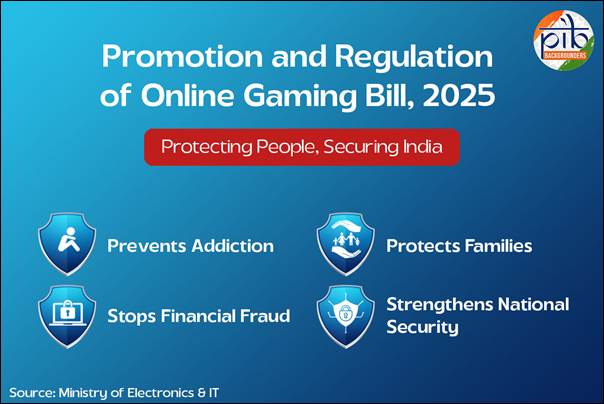Protecting middle class and youth; promoting e-sports, online social games

FinTech BizNews Service
Mumbai, August 21, 2025: The Promotion and Regulation of Online Gaming Bill, 2025, passed by the Parliament on 21st August 2025, marks a landmark move to shield citizens from the menace of online money games while promoting and regulating other kinds of online games. This legislation is designed to curb addiction, financial ruin and social distress caused by predatory gaming platforms that thrive on misleading promises of quick wealth. It reflects the Government’s resolve to safeguard families while guiding the digital economy towards safe and constructive growth.

The seriousness of the issue is recognised globally. The World Health Organization classifies gaming disorder as a health condition in its International Classification of Diseases, describing it as a pattern of play marked by loss of control, neglect of other daily activities, and persistence despite harmful consequences. This highlights why decisive action is necessary in India as well.
Online money gaming platforms have caused widespread harm. Families have lost their savings. Young people have fallen into addiction. In some heartbreaking cases, financial distress linked to these games has even led to suicides. The Government has recognised these dangers and responded with strong legislation.
At the same time, the Bill takes a balanced approach. It recognizes the online gaming sector as one of the most dynamic segments of the digital and creative economy, with significant opportunities for innovation, cognitive development, employment generation, technological advancement and global competitiveness. It encourages e-sports, which are organised competitive video games, and promotes safe online social and educational games. It clearly separates constructive digital recreation from betting, gambling and fantasy money games that exploit users with false promises of profit.
By doing so, the Bill ensures that India can embrace the benefits of digital innovation while protecting its people from the darker side of online gaming.
Understanding the Online Gaming Sector
The online gaming sector has grown rapidly in recent years and now stands as a major component of the digital economy. It is broadly divided into three distinct segments, each with its own features and implications for society.
Why the Bill Was Needed
The rapid spread of online money games has created serious risks for individuals, families and the nation. While digital technology has brought many benefits, these games have exploited loopholes in the law and caused deep social harm. Speaking in the Rajya Sabha, Union Minister for Electronics and Information Technology, Shri Ashwini Vaishnaw said that according to an estimate, 45 crore people are negatively affected by online money games and faced a loss of more than Rs. 20,000 crores because of it. The Government has acted to close these gaps and protect citizens.
At the same time the online gaming sector is one of the most dynamic and fast-growing segments of the digital and creative economy. India is emerging as a major game making hub with rapidly developing capabilities. The sector offers immense opportunities for innovation, employment generation and global competitiveness. However, there is a lack of coherent and enabling legal framework that can promote structured growth of the sector and allow responsible gaming practices to evolve. Urgent policy intervention was therefore required for the sector.
Further, many gaming platforms operate from offshore jurisdictions. Regulating these platforms presents challenges in terms of extra-territorial jurisdiction and inter-state inconsistencies. It was therefore expedient for the Ministry of Electronics & Information Technology to legislate over the sector in terms of Allocation of Business Rules.
The key reasons are:
Key Provisions of the Bill
The Bill lays down a comprehensive framework to promote safe digital recreation while prohibiting harmful practices linked to online money games. Its main provisions are as follows:
Applicability
The legislation will apply to the whole of India and also to online money gaming service offered within the territory of India or operated from outside the territory of India.
Promotion and Recognition of E-Sports
E-sports have been recognised as a legitimate competitive sport in India. The Ministry of Youth Affairs and Sports will prepare guidelines and standards for tournaments. Training academies, research centres and technology platforms will be set up to advance the sector. Incentive schemes and awareness programmes will also be launched to integrate e-sports into broader sports policies.
Promotion of Social and Educational Games
The Central Government has been given powers to recognise and register social games that are safe and age-appropriate. These games may focus on education, culture, or skills. Dedicated platforms will be developed to distribute such content. Awareness campaigns will highlight the positive role of these games in building digital literacy and encouraging healthy recreation.
Prohibition of Harmful Online Money Games
The Bill imposes a complete ban on online money games. This applies to games of chance, games of skill, and those that combine both. Advertising and promotion of such games is strictly prohibited. Financial transactions related to these platforms cannot be processed by banks or payment systems. Authorities will also be empowered to block access to unlawful platforms under the Information Technology Act, 2000.
Establishment of an Online Gaming Authority
A national-level regulatory authority will be established, or an existing one may be designated for oversight. Its functions will include categorising and registering online games, deciding whether a game qualifies as a money game, and addressing public grievances. The Authority will issue guidelines, codes of practice and directions to ensure compliance.
Offences and Penalties
Strict punishments have been introduced. Offering or facilitating online money games can lead to imprisonment of up to three years and a fine of up to one crore rupees. Financial transactions linked to these games are also punishable with similar penalties. Advertising such games can attract a jail term of up to two years and a fine of up to fifty lakh rupees.
Repeat offenders face harsher punishments, including imprisonment of up to five years and fines of up to two crore rupees. Offences under key provisions will be cognisable and non-bailable, which means police can arrest without a warrant and bail is not a right.
Corporate and Institutional Liability
Companies and their officers will be held accountable for offences. However, independent directors and non-executive directors, who are not involved in day-to-day decisions, will not be punished if they can show that they acted with due diligence.
Powers of Investigation and Enforcement
The Central Government may authorise officers to investigate, search and seize both digital and physical property linked to offences. In certain cases, officers will have the power to enter premises and make arrests without a warrant. Investigations will follow the provisions of the Bharatiya Nagarik Suraksha Sanhita, 2023, which governs criminal procedure in India.
Rule-Making Powers
The Central Government to have the authority to frame rules for the promotion of e-sports and social games, the recognition and registration of online games, and the functioning of the Online Gaming Authority. It may also make rules on any other matter required under this law.
How the Bill Benefits Society
The Promotion and Regulation of Online Gaming Bill, 2025 is expected to deliver wide-ranging benefits for society and the economy. Its main positive impacts are:
Other Notable Initiatives to Counter the Risks of Online Gaming
The Government has introduced several measures to protect citizens from the dangers of online gaming. These include addiction, financial fraud, money laundering and cybercrime.

Key steps are as follows:
Information Technology Act, 2000 and Related Rules
Bharatiya Nyaya Sanhita, 2023
Integrated Goods and Services Tax Act, 2017 (IGST Act)
Consumer Protection Act, 2019
Advisories by Ministries
Reporting of Cybercrimes
Conclusion
The Promotion and Regulation of Online Gaming Bill, 2025, marks a decisive step in India’s digital journey. It recognises the dangers of unregulated money gaming and responds with firm safeguards to protect citizens. At the same time, it carves out space for e-sports and educational games that nurture skills and creativity. By balancing innovation with responsibility, the Bill sets the tone for a safer and healthier digital future. It also strengthens India’s standing as a nation that can lead in shaping global digital policy. Most importantly, it ensures that technology serves society rather than harms it.